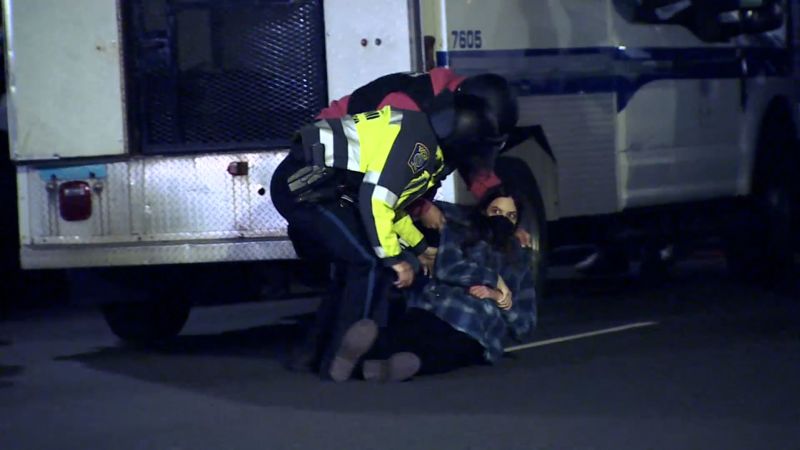Has your flight been canceled or delayed? You’re not alone. In fact, you’re among tens of thousands of people affected by mass flight cancellations over the past year. Read on to understand why these travel disruptions are happening, what to do if you’re impacted, and how to more likely avoid flight cancellations in 2023.
What to do if your flight is canceled
Follow these steps to claim compensation in the event your flight has been canceled or delayed.
Get on the airline’s app – or make an international call
First, pull up the airline’s app on your phone. Most airline apps allow you to easily rebook your flight for free. Getting in line to speak with an agent and calling the airline while you wait is also a good idea (albeit slower than using an app), and social media messaging, texting or WhatsApp may prove helpful. “During times of mass travel disruption, you should try all different avenues for getting help,” says Nick Ewen, director of content at The Points Guy.
Ewen also recommends a lesser-known tactic: calling the airline’s international numbers. Airlines have offices in Canada, Mexico, the U.K. and more. “While it can be costly, you can often get through to an agent more quickly,” Ewen says.
Note that, depending on why your flight was canceled, finding seats on a new flight may prove difficult and may alter your travel plans considerably.
Book a hotel
Next, determine if you need overnight accommodations. “If you were originally booked on the last flight of the night and there are no other options, grab a hotel room near the airport before they’re all taken,” Ewen advises.
Ask for a refund
If the airline cancels your flight or it’s “significantly delayed” (currently defined on a case-by-case basis) and you’re forced to change your travel plans, the Department of Transportation requires airlines to provide a full refund. Unfortunately, getting a refund is often a lengthy and frustrating process, and as such, the DOT is actively working to improve this with protections for flyers – including $600 million in refunds and legal action against several airlines. Most airlines will instead offer a voucher – but be wary of vouchers, since they often come with limitations such as blackout and expiration dates.
When you’re able to get a refund, note that it covers the total cost of airfare only and does not include other expenses associated with your trip.
Review your airline’s cancellation policy
While you’re entitled to a full refund, other flight cancellation policies may vary by airline. Use the links below to review the cancellation policies and passenger rights for each of the major U.S.-based airlines, as well as how to apply for a refund.
What to do if your flight is delayed
In the event your flight is delayed, airlines are not legally obligated to give you a refund unless the DOT determines the delay to be “significant.” But here’s what you can do:
Research other flights
Investigate what other flights on that airline are headed to your destination, and ask an agent if they can get you on one of them (without charging change fees). Also be sure to look into what’s available on other airlines: If your original airline doesn’t have any flights available on your departure date, an agent may be able to book you on a flight with a different carrier at no additional cost to you. Note, however, that airlines are not legally required to do this.
Inquire about other compensation
If you’ve been stranded at the airport for several hours, check in with an agent – regardless of whether you’re able to get on another flight. Some airlines may provide amenities such as vouchers for meals or overnight accommodations.
Why are flights being canceled?
“There are two primary causes for the rash of controllable cancellations we saw in 2022: overscheduling and antiquated airline technology,” says Scott Keyes, founder and chief flight expert at Going (formerly Scott’s Cheap Flights).
- Overscheduling: “Controllable cancellations spiked around Memorial Day as travel demand bounced back quicker than expected and airlines realized they had far more flights scheduled than they were able to operate,” Keyes explains. “This was due in large part to the ongoing pilot shortage, but also labor shortages in other essential areas like aircraft mechanics.” The result? Full flights with few rebooking options.
- Outdated airline technology: “Internal systems at many airlines are built on top of 1970s technology,” says Keyes. “Most of the time it works fine, but on occasion when there’s a lot of cancellations (even for understandable reasons like a winter storm) it can buckle under the weight.” This is exactly what happened to Southwest Airlines in December 2022; its outdated software system couldn’t adequately respond to a series of winter storms, forcing the airline to leave thousands of travelers stranded.
Despite the chaos, it’s important to note airline cancellations have actually improved since summer 2022. “Flight disruptions from July through October were actually below historical averages,” says Keyes, noting that the pilot shortage has been marginally improving, and that airlines are getting better at putting out a schedule that’s realistic rather than optimistic.
How to avoid flight cancellations and delays in the future
It’s almost impossible to avoid canceled or delayed flights these days. But there are a few things you can do when booking flights to lessen your chances for travel disruptions.
Keep tabs on your aircraft
On your departure date, check your flight status before heading to the airport. You can keep a watchful eye on your itinerary and the aircraft scheduled to operate your flight using the airline’s app or a third-party app such as FlightAware Flight Tracker (which also offers a website), FlightRadar24 or TripIt Pro.
“As an example, if you’re flying from Orlando to New York, and your plane is flying in from Chicago, the initial flight from Chicago to Orlando might be delayed (or canceled) before yours is,” Ewen explains. “Airlines will try to find replacement aircraft in that case, but if you can identify a potential cancellation before it officially happens, you may be able to get rebooked ahead of the other 100-plus passengers on your flight.”
Consider an alternate airport
When booking your flight, you may consider flying out of a different airport than the one you typically depart from. For example, a small regional airport with limited routes may mean less travel delays and hassle overall – or it may be worth driving further to another international airport for a nonstop flight to your destination rather than opting for a connecting flight close to home.
Fly in the morning
While flight disruptions are unpredictable, historically fewer cancellations and delays occur in the morning.
Avoid weekend travel
Fly on off-peak days like Tuesday or Wednesday. You’ll often find cheaper flights on these days, too.
Opt for longer layovers
If you need to take more than one flight to reach your destination, book a flight with a longer layover to provide enough time to make your connecting flight. Keep in mind that at some airports you may need to go through security or customs for your connection. For longer journeys, you can reduce the risk of missing connecting flights by planning a city stopover. For example, Icelandair offers Iceland stopovers for no additional airfare.
Consider a credit card with travel protections
You don’t need to be a frequent traveler to take advantage of credit card travel protections and perks. Here are a couple options to consider:
- Chase Sapphire Preferred: This travel credit card ($95 annually) provides coverage for delays and cancellations when used to book flights. It also provides other travel protections such as delayed baggage coverage. “Even someone who travels just once or twice a year can still get phenomenal value from this card,” says Ewen.
- Platinum Card from American Express: This card ($695 annually) offers travel insurance that reimburses some nonrefundable expenses like hotel accommodations, meals and other essentials as long as the trip was purchased using the card.
When choosing a travel credit card, also pay attention to other benefits. Even the most basic airline credit cards can offer travel perks like discounts on in-flight purchases and waived baggage fees, while premium travel credit cards (which require a higher annual fee) can include access to an airport lounge with food, drinks and Wi-Fi. Some also provide a concierge service to rebook flights or built-in trip insurance to cover unforeseen expenses.
Purchase travel insurance for flights
If your credit card doesn’t include travel protections, consider purchasing flight insurance – even a cheap travel policy can help protect your investment. Daniel Durazo, director of marketing and communications for Allianz Global Assistance, says that, depending on the length of your delay and your coverage, “[travel insurance] may reimburse you for lost prepaid expenses, as well as costs you incur because of the delay, including meals, accommodations, communication and transportation.”
Covered reasons include a travel carrier delay and loss or theft of travel documents, among other scenarios. Coverage varies when it comes to delays and cancellations associated with COVID-19, so it’s important to check with your provider about COVID-19 travel insurance. If you’re interested in purchasing a policy, you can browse the best travel insurance companies here.
Talk to a travel adviser
“In the event of a flight delay or cancellation, travel advisers have a number of tools to assist,” says Peter Vlitas, senior vice president of airline relations at Travel Leaders Group, one of the largest travel agency companies. “If we anticipate flight delays due to weather, for example, travel advisers receive advance waivers so they can select alternative flights before they sell out.”
If you didn’t purchase flights through a travel adviser, you can pay for a service like Cranky Concierge’s Urgent Assistance plan, which charges a fee per one-way flight to help travelers find a solution to flight changes (either delays, cancellations or missed connections) and proactively monitor future trips.
Avoid checking luggage
Travelers who only travel with a carry-on bag and/or personal item (such as a backpack or purse) that meet carry-on size restrictions will have the most flexibility in rebooking – and will also avoid the chance of lost luggage, another increasingly common issue. Some carriers will try to move checked luggage to a later flight for you and will make every effort to keep you and your belongings together. However, when airlines don’t have interline agreements with other carriers, you’ll have to allow enough time to retrieve and recheck your own luggage.
You may also be interested in:
23 Top All-Inclusive Resorts in the U.S.








More News
The 13 Best Presidents Day Weekend Getaways
The 5 Best Soft-sided Luggage Picks of 2024
The 9 Best Northern Lights Alaska Cruises for 2024 & Beyond